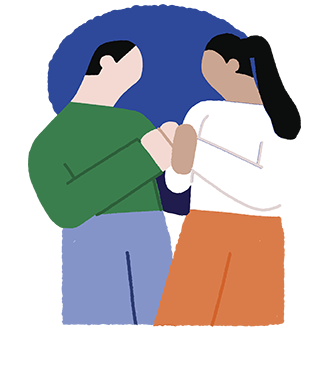Addiction is a complex and devastating issue affecting millions of people around the globe. Unfortunately, young people are particularly vulnerable and face higher risks of developing this condition.
Recent estimates show that 74.0% of those who struggle with addiction and are admitted to a treatment center began substance use at 17 or younger, and 10.2% started using substances as young as 11. Studies show that early substance use quadruples the risk of developing a substance use disorder. These worrying statistics should prompt parents to take action.
Approaching this topic with teenagers can be difficult. Certain approaches work better than others so we have included the best tactics to use when speaking with your child about this topic. Providing them with the proper education, tools and safe space to talk about their use can help them avoid long term consequences and improve their quality of life.
Addiction is a pattern of using a substance or engaging in an activity that becomes difficult or impossible to control and can lead to harmful consequences. It involves changes in the brain that make an impulsive action become compulsive and painful to stop.
There are various types of addiction that plague young people. Alcohol, stimulants (i.e. cocaine, methamphetamine, and amphetamine medications such as Adderall), sedatives (i.e. benzodiazepine medications such as Xanax, Valium and Klonopin), opioids (i.e. heroin, fentanyl and medications such as OxyContin, Vicodin and Percocet), nicotine (i.e. cigarettes, dip, chew and vaping), and cannabis (marijuana) are the most common substances leading to addiction in young people. Additionally, many teenagers have been struggling with behavioral addictions, such as problematic gaming, gambling, use of social media, and even eating.
Addiction alters brain chemistry, hijacking reward pathways, impulse control, and decision-making abilities. It diminishes the ability to experience pleasure from other sources, leading to detrimental changes in one’s behavior. Such changes cause people to prioritize their addiction over their responsibilities, well-being, and relationships. Additionally, substance use can lead to tolerance, the need for higher amounts of a substance to achieve the same effects, and withdrawal, physical pain and discomfort when stopping use. These factors make it more difficult to feel “normal” without a substance and contribute to prioritizing use over all other aspects of life.

Certain conditions or experiences can increase the risk for developing an addiction. For young people, environmental conditions such as peer influence, and behaviors such as using substances before age 15, can contribute to the development of a substance use disorder. Additionally, psychological factors such as mental health disorders and trauma can increase the risk for addiction. It’s also important to note that genetic predisposition can play a role in substance use; specific genes can increase vulnerability by altering brain function and response to certain substances.
There are common behaviors that have been observed with people struggling with addiction. The following signs are worth investigating together with your child:
Supporting a loved one with addiction requires empathy, patience, and understanding. Think back to when you were young and try to view things from their perspective. Learn up-to-date information about addiction and review nonjudgmental terms to use.

Starting a conversation with your child about addiction can be challenging, yet essential in ensuring their well-being. Here are practical tips to help you approach this sensitive discussion with honesty, care, and openness:
Prepare to answer difficult questions about addiction and provide accurate information to your loved one. Listen actively and validate your child’s feelings, letting them know that addiction is a complicated issue many people struggle with. Address any stigma or shame around addiction by reassuring your child that it’s a health condition, not a moral failing.
Here are tips on fostering positive coping mechanisms to help your child navigate addiction challenges.
Above all, offer your child love, understanding, and continuous encouragement for them to feel supported.
If your child continues to struggle, encourage them to seek professional help and assist them in finding appropriate treatment options.
Choosing an appropriate, individualized treatment plan is essential to recovery. There are multiple levels of addiction treatment, such as detox, inpatient or residential rehab stays, or outpatient treatment. Medications can be used for some forms of addiction to help reduce cravings and prevent use. Additionally, individual and family therapy can decrease risk for relapse. There are also resources to help connect you to the right level of treatment, such as the Substance Abuse and Mental Health Services Administration (SAMHSA) National Helpline 1-800-662-HELP (4357) and treatment locator.
Support groups can also be beneficial, and there are many options from 12-Step programs like AA or NA to more skill-focused groups such as SMART Recovery. Accompanying your child to support groups can help affirm your commitment to their recovery.
If you are concerned for a loved one who may be showing symptoms of an addiction, we are here to help. Download our eBook, “How to Help a Loved One Struggling with Substance Use Disorder,” for information on addiction and how to best help someone experiencing it while still caring for your own mental health.
If you need help with your substance use disorder, Eleanor Health is here to help you build your confidence and momentum towards the future you want. We provide treatment services for adults with alcohol, opioid, and other substance use disorders. We are currently located in Florida, Louisiana, Massachusetts, North Carolina, New Jersey, Ohio, Texas, and Washington.
 E-book: How to Help a Loved One Struggling with Substance Use Disorder
E-book: How to Help a Loved One Struggling with Substance Use Disorder
 Alcoholism: A Family Disease
Alcoholism: A Family Disease
 How To Help Someone Through Drug or Alcohol Withdrawal
How To Help Someone Through Drug or Alcohol Withdrawal